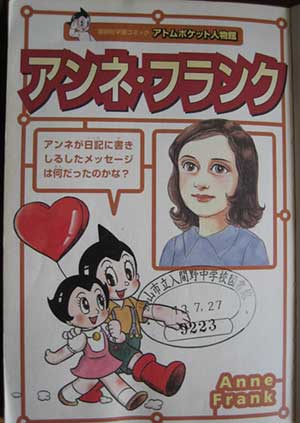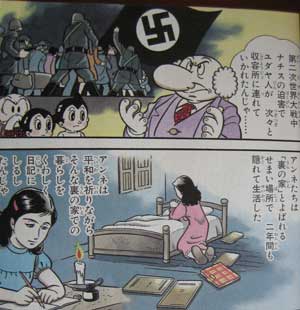As popular as manga now is, it has simply never appealed to me. Yet that’s not to say that I don’t appreciate it as an art form, and in Japan especially, it is used to introduce a whole host of ideas and issues. Invariably garnering a much wider audience than the more traditional text-only format.
That said, some things one would presume don’t really need the manga treatment. The story and message resonating strongly enough without pictures. Or in the case below, the cute contrast of perennial favourite Atom Boy.

Yes, The Diary Of Anne Frank is available not only in manga format, but Atom Boy, his sister Uran, and the dodgy looking Dr. Ochanomizu kindly help the story flow. The cheery little chaps guiding the reader along in their usual jaunty and jolly manner.

Tim says
There is definately some cognitive dissonnance there for me, but I think it can be forgiven if it brings home what the holocaust was to some people who otherwise would never really give it much thought, or who would never otherwise read the diary of Anne Frank.
Somehow hearing abstractly about 6 million killed just does not make the same emotional connection as reading the full story of one little girl and her family. The fact that there were millions of such stories, mostly untold and unknown is very sad.
The Anime movie Hotaru no Haka (Grave of the Fireflies) is another very sad movie about children in the war. I cried and cried.
Tim says
We should also remember that Atom, although cute in appearance has a dark side (I also think he predates the really gratuitous cute movement in Japanese popular culture, as represented by Kitty). Atom of course is connected to the A-bomb in the mind of Tezuka, and so he has been used to introduce children to the themes of the Second World War, so he is maybe not so inappropriate a character. A Hello Kitty version of Anne Frank would probably be in much poorer taste.
Forrest says
Also, this is far from the first time Tezuka has addressed issues related to the German role in World War II or the Holocaust. His most famous work in that direction is Adolf, a complex examination of three men of the same name. Very little of it focuses upon Adolf Hitler himself, and it follows the fate of the other two Adolfs from their childhoods as children in Japan all the way through to battles in Israel during the Six Days’ War. Tezuka seems constitutionally incapable of keeping his more cartoony characters out of his more serious works, especially later in his life (perhaps the most bizarre example of this is his biography of Buddha), but his intention always seemed to be to help a young Japanese audience relate to material that would have been very foreign to them.
I don’t think most English-speaking people who’ve read Anne Frank’s diary realize how heavily edited the work they’ve read is, and it’s already suffered quite a bit of loss of idiom in translation to English. When you add the complexities of portraying Judaism, a religion very much unfamiliar to most Japanese (unless you, like, count reggae fans), to the fact that pretty much everything ends up in manga eventually, it makes perfect sense that Tezuka would have done things the way he did.
The weird thing will be if somebody translates it back into English.
[Neubauten] says
What year is the manga of?
Sorry for my bad english, i know it sucks.
zAiny says
im readin anne frank’s diary lehx.itsh kinda cruel at e endin part lox.
bwest wishes.zAiny.